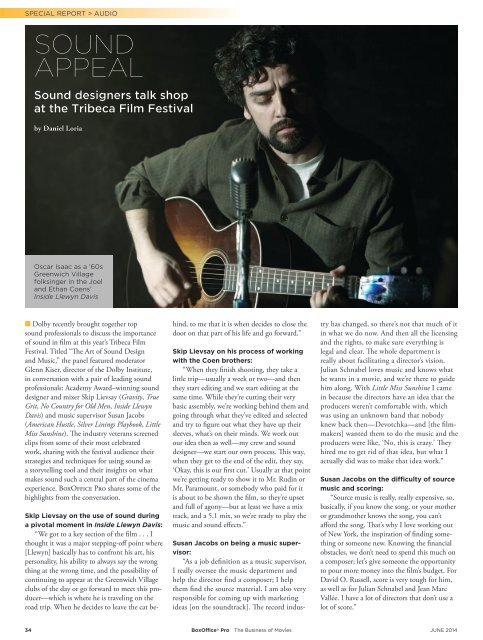Create successful ePaper yourself
Turn your PDF publications into a flip-book with our unique Google optimized e-Paper software.
SPECIAL REPORT > AUDIO<br />
SOUND<br />
APPEAL<br />
Sound designers talk shop<br />
at the Tribeca Film Festival<br />
by Daniel Loria<br />
Oscar Isaac as a ’60s<br />
Greenwich Village<br />
folksinger in the Joel<br />
and Ethan Coens’<br />
Inside Llewyn Davis<br />
n Dolby recently brought together top<br />
sound professionals to discuss the importance<br />
of sound in film at this year’s Tribeca Film<br />
Festival. Titled “The Art of Sound Design<br />
and Music,” the panel featured moderator<br />
Glenn Kiser, director of the Dolby Institute,<br />
in conversation with a pair of leading sound<br />
professionals: Academy Award–winning sound<br />
designer and mixer Skip Lievsay (Gravity, True<br />
Grit, No Country for Old Men, Inside Llewyn<br />
Davis) and music supervisor Susan Jacobs<br />
(American Hustle, Silver Linings Playbook, Little<br />
Miss Sunshine). The industry veterans screened<br />
clips from some of their most celebrated<br />
work, sharing with the festival audience their<br />
strategies and techniques for using sound as<br />
a storytelling tool and their insights on what<br />
makes sound such a central part of the cinema<br />
experience. BoxOffice <strong>Pro</strong> shares some of the<br />
highlights from the conversation.<br />
Skip Lievsay on the use of sound during<br />
a pivotal moment in Inside Llewyn Davis:<br />
“We got to a key section of the film . . . I<br />
thought it was a major stepping-off point where<br />
[Llewyn] basically has to confront his art, his<br />
personality, his ability to always say the wrong<br />
thing at the wrong time, and the possibility of<br />
continuing to appear at the Greenwich Village<br />
clubs of the day or go forward to meet this producer—which<br />
is where he is traveling on the<br />
road trip. When he decides to leave the cat behind,<br />
to me that it is when decides to close the<br />
door on that part of his life and go forward.”<br />
Skip Lievsay on his process of working<br />
with the Coen brothers:<br />
“When they finish shooting, they take a<br />
little trip—usually a week or two—and then<br />
they start editing and we start editing at the<br />
same time. While they’re cutting their very<br />
basic assembly, we’re working behind them and<br />
going through what they’ve edited and selected<br />
and try to figure out what they have up their<br />
sleeves, what’s on their minds. We work out<br />
our idea then as well—my crew and sound<br />
designer—we start our own process. This way,<br />
when they get to the end of the edit, they say,<br />
‘Okay, this is our first cut.’ Usually at that point<br />
we’re getting ready to show it to Mr. Rudin or<br />
Mr. Paramount, or somebody who paid for it<br />
is about to be shown the film, so they’re upset<br />
and full of agony—but at least we have a mix<br />
track, and a 5.1 mix, so we’re ready to play the<br />
music and sound effects.”<br />
Susan Jacobs on being a music supervisor:<br />
“As a job definition as a music supervisor,<br />
I really oversee the music department and<br />
help the director find a composer; I help<br />
them find the source material. I am also very<br />
responsible for coming up with marketing<br />
ideas [on the soundtrack]. The record industry<br />
has changed, so there’s not that much of it<br />
in what we do now. And then all the licensing<br />
and the rights, to make sure everything is<br />
legal and clear. The whole department is<br />
really about facilitating a director’s vision.<br />
Julian Schnabel loves music and knows what<br />
he wants in a movie, and we’re there to guide<br />
him along. With Little Miss Sunshine I came<br />
in because the directors have an idea that the<br />
producers weren’t comfortable with, which<br />
was using an unknown band that nobody<br />
knew back then—Devotchka—and [the filmmakers]<br />
wanted them to do the music and the<br />
producers were like, ‘No, this is crazy.’ They<br />
hired me to get rid of that idea, but what I<br />
actually did was to make that idea work.”<br />
Susan Jacobs on the difficulty of source<br />
music and scoring:<br />
“Source music is really, really expensive, so,<br />
basically, if you know the song, or your mother<br />
or grandmother knows the song, you can’t<br />
afford the song. That’s why I love working out<br />
of New York, the inspiration of finding something<br />
or someone new. Knowing the financial<br />
obstacles, we don’t need to spend this much on<br />
a composer; let’s give someone the opportunity<br />
to pour more money into the film’s budget. For<br />
David O. Russell, score is very tough for him,<br />
as well as for Julian Schnabel and Jean Marc<br />
Vallée. I have a lot of directors that don’t use a<br />
lot of score.”<br />
34 BoxOffice ® <strong>Pro</strong> The Business of Movies JUNE <strong>2014</strong>

















